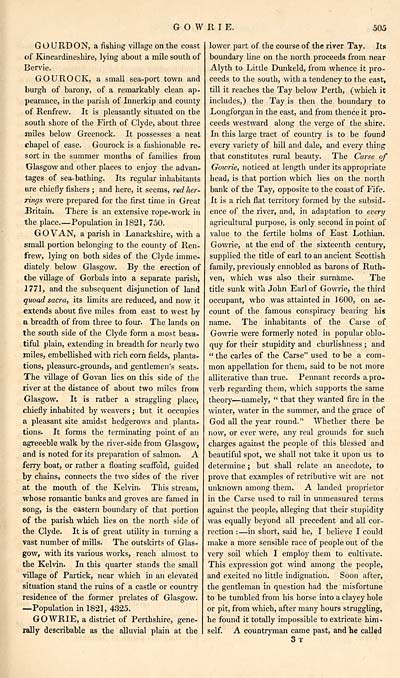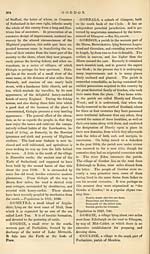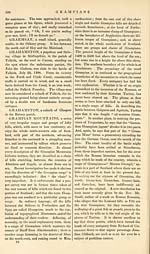Gazetteer of Scotland > Volume 2
(19) Page 505
Download files
Complete book:
Individual page:
Thumbnail gallery: Grid view | List view

G O W It I E.
505
GO URDON, a fishing village on the coast
of Kincardineshire, lying about a mile south of
Bervie.
GOUROCK, a small sea-port town and
burgh of barony, of a remarkably clean ap-
pearance, in the parish of Innerkip and county
of Renfrew. It is pleasantly situated on the
south shore of the Firth of Clyde, about three
miles below Greenock. It possesses a neat
chapel of ease. Gourock is a fashionable re-
sort in the summer months of families from
Glasgow and other places to enjoy the advan-
tages of sea-bathing. Its regular inhabitants
are chiefly fishers ; and here, it seems, red her-
rings were prepared for the first time in Great
Britain. There is an extensive rope-work in
the place. — Population in 1821, 750.
GO VAN, a parish in Lanarkshire, with a
small portion belonging to the county of Ren-
frew, lying on both sides of the Clyde imme-
diately below Glasgow. By the erection of
the village of Gorbals into a separate parish,
1771, and the subsequent disjunction of land
quoad sacra, its limits are reduced, and now it
extends about five miles from east to west by
a breadth of from three to four. The lands on
the south side of the Clyde form a most beau-
tiful plain, extending in breadth for nearly two
miles, embellished with rich corn fields, planta-
tions, pleasure-grounds, and gentlemen's seats.
The village of Govan lies on this side of the
river at the distance of about two miles from
Glasgow. It is rather a straggling place,
chiefly inhabited by weavers ; but it occupies
a pleasant site amidst hedgerows and planta-
tions. It forms the terminating point of an
agreeeble walk by the river-side from Glasgow,
and is noted for its preparation of salmon. A
ferry boat, or rather a floating scaffold, guided
by chains, connects the two sides of the river
at the mouth of the Kelvin. This stream,
whose romantic banks and groves are famed in
song, is the eastern boundary of that portion
of the parish which lies on the north side of
the Clyde. It is of great utility in turning a
vast number of mills. The outskirts of Glas-
gow, with its various works, reach almost to
the Kelvin. In this quarter stands the small
village of Partick, near which in an elevated
situation stand the ruins of a castle or country
residence of the former prelates of Glasgow.
—Population in 1821, 4325.
GOWRIE, a district of Perthshire, gene-
rally describable as the alluvial plain at the
lower part of the course of the river Tay. Its
boundary Line on the north proceeds from near
Alyth to Little Dunkeld, from whence it pro-
ceeds to the south, with a tendency to the east,
till it reaches the Tay below Perth, (which it
includes,) the Tay is then the boundary to
Longforgan in the east, and from thence it pro-
ceeds westward along the verge of the shire.
In this large tract of country is to be found
every variety of hill and dale, and every thing
that constitutes rural beauty. The Carse of
Gowrie, noticed at length under its appropriate
head, is that portion which lies on the north
bank of the Tay, opposite to the coast of Fife.
It is a rich flat territoiy formed by the subsid-
ence of the river, and, in adaptation to evert/
agricultural purpose, is only second in point of
value to the fertile holms of East Lothian.
Gowrie, at the end of the sixteenth century,
supplied the title of earl to an ancient Scottish
family, previously ennobled as barons of Ruth-
ven, which was also their surname. The
title sunk with John Earl of Gowrie, the third
occupant, who was attainted in 1 600, on ac-
count of the famous conspiracy bearing his
name. The inhabitants of the Carse of
Gowrie were formerly noted in popular oblo-
quy for their stupidity and churlishness ; and
" the carles of the Carse" used to be a com-
mon appellation for them, said to be not more
alliterative than true. Pennant records apro-
verb regarding them, which supports the same
theory — namely, " that they wanted fire in the
winter, water in the summer, and the grace of
God all the year round." Whether there be
now, or ever were, any real grounds for such
charges against the people of this blessed and
beautiful spot, we shall not take it upon us to
determine ; but shall relate an anecdote, to
prove that examples of retributive wit are not
unknown among them. A landed proprietor
in the Carse used to rail in unmeasured terms
against the people, alleging that their stupidity
was equally beyond all precedent and all cor-
rection : — in short, said he, I believe I could
make a more sensible race of people out of the
very soil which I employ them to cultivate.
This expression got wind among the people,
and excited no little indignation. Soon after,
the gentleman in question had the misfortune
to be tumbled from his horse into a clayey hole
or pit, from which, after many hours struggling,
he found it totally impossible to extricate him-
self. A countryman came past, and he called
3t
505
GO URDON, a fishing village on the coast
of Kincardineshire, lying about a mile south of
Bervie.
GOUROCK, a small sea-port town and
burgh of barony, of a remarkably clean ap-
pearance, in the parish of Innerkip and county
of Renfrew. It is pleasantly situated on the
south shore of the Firth of Clyde, about three
miles below Greenock. It possesses a neat
chapel of ease. Gourock is a fashionable re-
sort in the summer months of families from
Glasgow and other places to enjoy the advan-
tages of sea-bathing. Its regular inhabitants
are chiefly fishers ; and here, it seems, red her-
rings were prepared for the first time in Great
Britain. There is an extensive rope-work in
the place. — Population in 1821, 750.
GO VAN, a parish in Lanarkshire, with a
small portion belonging to the county of Ren-
frew, lying on both sides of the Clyde imme-
diately below Glasgow. By the erection of
the village of Gorbals into a separate parish,
1771, and the subsequent disjunction of land
quoad sacra, its limits are reduced, and now it
extends about five miles from east to west by
a breadth of from three to four. The lands on
the south side of the Clyde form a most beau-
tiful plain, extending in breadth for nearly two
miles, embellished with rich corn fields, planta-
tions, pleasure-grounds, and gentlemen's seats.
The village of Govan lies on this side of the
river at the distance of about two miles from
Glasgow. It is rather a straggling place,
chiefly inhabited by weavers ; but it occupies
a pleasant site amidst hedgerows and planta-
tions. It forms the terminating point of an
agreeeble walk by the river-side from Glasgow,
and is noted for its preparation of salmon. A
ferry boat, or rather a floating scaffold, guided
by chains, connects the two sides of the river
at the mouth of the Kelvin. This stream,
whose romantic banks and groves are famed in
song, is the eastern boundary of that portion
of the parish which lies on the north side of
the Clyde. It is of great utility in turning a
vast number of mills. The outskirts of Glas-
gow, with its various works, reach almost to
the Kelvin. In this quarter stands the small
village of Partick, near which in an elevated
situation stand the ruins of a castle or country
residence of the former prelates of Glasgow.
—Population in 1821, 4325.
GOWRIE, a district of Perthshire, gene-
rally describable as the alluvial plain at the
lower part of the course of the river Tay. Its
boundary Line on the north proceeds from near
Alyth to Little Dunkeld, from whence it pro-
ceeds to the south, with a tendency to the east,
till it reaches the Tay below Perth, (which it
includes,) the Tay is then the boundary to
Longforgan in the east, and from thence it pro-
ceeds westward along the verge of the shire.
In this large tract of country is to be found
every variety of hill and dale, and every thing
that constitutes rural beauty. The Carse of
Gowrie, noticed at length under its appropriate
head, is that portion which lies on the north
bank of the Tay, opposite to the coast of Fife.
It is a rich flat territoiy formed by the subsid-
ence of the river, and, in adaptation to evert/
agricultural purpose, is only second in point of
value to the fertile holms of East Lothian.
Gowrie, at the end of the sixteenth century,
supplied the title of earl to an ancient Scottish
family, previously ennobled as barons of Ruth-
ven, which was also their surname. The
title sunk with John Earl of Gowrie, the third
occupant, who was attainted in 1 600, on ac-
count of the famous conspiracy bearing his
name. The inhabitants of the Carse of
Gowrie were formerly noted in popular oblo-
quy for their stupidity and churlishness ; and
" the carles of the Carse" used to be a com-
mon appellation for them, said to be not more
alliterative than true. Pennant records apro-
verb regarding them, which supports the same
theory — namely, " that they wanted fire in the
winter, water in the summer, and the grace of
God all the year round." Whether there be
now, or ever were, any real grounds for such
charges against the people of this blessed and
beautiful spot, we shall not take it upon us to
determine ; but shall relate an anecdote, to
prove that examples of retributive wit are not
unknown among them. A landed proprietor
in the Carse used to rail in unmeasured terms
against the people, alleging that their stupidity
was equally beyond all precedent and all cor-
rection : — in short, said he, I believe I could
make a more sensible race of people out of the
very soil which I employ them to cultivate.
This expression got wind among the people,
and excited no little indignation. Soon after,
the gentleman in question had the misfortune
to be tumbled from his horse into a clayey hole
or pit, from which, after many hours struggling,
he found it totally impossible to extricate him-
self. A countryman came past, and he called
3t
Set display mode to: Large image | Transcription
Images and transcriptions on this page, including medium image downloads, may be used under the Creative Commons Attribution 4.0 International Licence unless otherwise stated. ![]()
| Gazetteers of Scotland, 1803-1901 > Gazetteer of Scotland > Volume 2 > (19) Page 505 |
|---|
| Permanent URL | https://digital.nls.uk/97431050 |
|---|
| Description | Volume II: Glenbanchor to Zetland. |
|---|---|
| Attribution and copyright: |
|
| Description | By Robert Chambers and William Chambers. Glasgow: Blackie & Son, 1838. 2 volumes. |
|---|---|
| Shelfmark | NF.1461.g.7 |
| Additional NLS resources: | |

